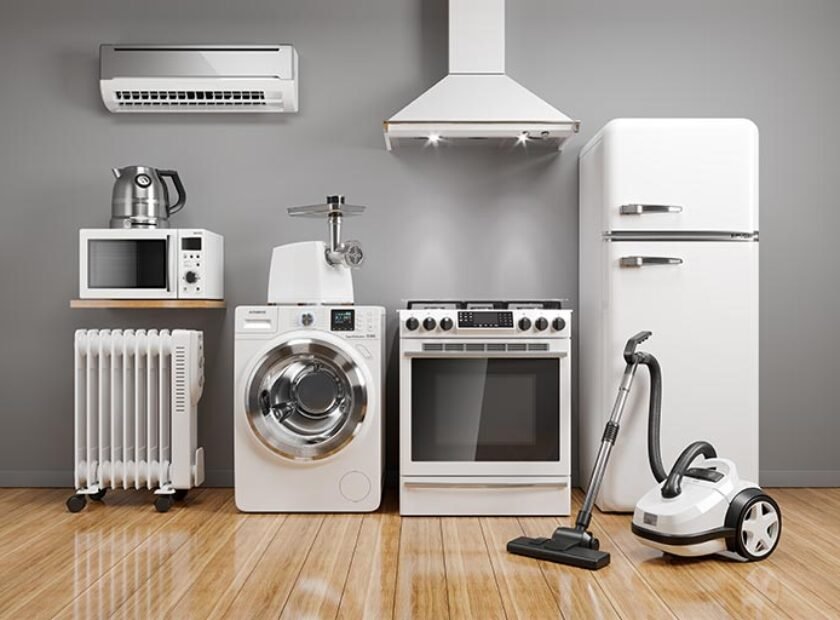Appliance recycling is a critical component of waste management in Massachusetts, where environmental sustainability and resource conservation are top priorities. With an increasing emphasis on reducing landfill waste and promoting the circular economy, the state has implemented several programs and regulations to ensure that old or unused appliances are disposed of responsibly.
This blog post will delve into the various aspects of appliance recycling in Massachusetts, including the what appliances can be recycled, available recycling programs, the environmental benefits of responsible appliance disposal, and tips for residents to participate effectively.

What type of appliances can be recycled in Massachusetts?
In Massachusetts, a wide range of household appliances can be recycled. These appliances are typically categorized into large and small appliances. Here’s a detailed breakdown of the types of appliances that can be recycled in the state:

Large Appliances (White Goods)
Large appliances, commonly referred to as “white goods”, are major household items that are often the primary focus of recycling programs due to their size, the materials they contain, and their potential environmental impact. These include:
Refrigerators and Freezers: These appliances are frequently recycled due to their size and the presence of harmful refrigerants like chlorofluorocarbons (CFCs) and hydrofluorocarbons (HFCs). Proper disposal ensures that these refrigerants are captured and prevented from contributing to depletion of the ozone layer and global warming.
Washing Machines and Dryers: These common household appliances contain valuable metals, such as steel and aluminum, which can be recovered through recycling. Additionally, components like motors and wiring are often salvaged for reuse.
Dishwashers: Dishwashers contain metal parts, including stainless steel, as well as electronic components that can be recycled. They also feature plastic elements that can be repurposed in the manufacturing of new products.
Ovens, Ranges, and Stovetops: These appliances are primarily composed of metal, making them suitable for recycling. Whether gas or electric, the metal casing, internal components, and sometimes even the glass in oven doors can be recycled.
Microwave Ovens: Although smaller than traditional ovens, microwaves are considered large appliances due to their size and the complexity of their components. They contain metal, glass, and electronic parts that are valuable in the recycling process.
Air Conditioners: Similar to refrigerators, air conditioners contain refrigerants that need to be carefully removed and recycled. The metal parts, including copper and aluminum, are also highly recyclable.
Water Heaters: These appliances are typically made of steel, which can be recycled. The internal components, including copper piping, can also be recovered for reuse.
Furnaces and Boilers: Larger heating appliances like furnaces and boilers can be recycled for their metal content, including steel and copper. These items often require specialized recycling due to their size and complexity.

Small Appliances
In addition to large appliances, many smaller household appliances can also be recycled. These items might be less cumbersome, but they still contain valuable materials and components that should not end up in landfills. Common small appliances include:
Toasters and Toaster Ovens: These kitchen appliances contain metal, glass, and plastic components that can be separated and recycled. The electronic parts, including wiring and heating elements, are also recyclable.
Blenders and Mixers: These appliances are typically composed of plastic housing, metal blades, and electronic controls, all of which can be recycled.
Coffee Makers: Coffee makers often include a combination of plastic, metal, and electronic components. Certain parts, such as glass carafes, can be recycled separately, while the rest of the appliance can be processed for its metal and plastic content.
Vacuum Cleaners: Vacuum cleaners contain motors, metal parts, and plastic housing that can be recycled. The electronic components, such as circuit boards and wiring, are also valuable in the recycling process.
Fans and Heaters: Both fans and small portable heaters are composed of metal, plastic, and electronic parts that can be recovered through recycling.
Irons and Ironing Boards: Irons are primarily made of metal, with some plastic components, and can be recycled. Ironing boards, depending on their material, may also be eligible for recycling, particularly those made of metal.
Hair Dryers and Curling Irons: These personal care appliances contain plastic and metal, with electronic elements that are recyclable.

Electronics and E-Waste
Although not traditionally categorized as appliances, electronic devices are often included in appliance recycling efforts due to the overlap in components and materials. In Massachusetts, the following electronic items are commonly recycled:
Televisions and Monitors: These items contain valuable materials like glass, metals, and plastics, as well as potentially hazardous materials like lead and mercury, which need to be properly handled.
Computers and Laptops: These devices are composed of a variety of recyclable materials, including metals (such as aluminum and copper), plastics, and electronic components.
Printers and Scanners: Office equipment like printers and scanners can be recycled for their plastic, metal, and electronic parts.
Stereos and Speakers: Audio equipment, including stereos and speakers, often contains metals, plastics, and electronic components that can be recovered and reused.

Specialty Appliances
Certain specialty appliances, while not as common, can also be recycled in Massachusetts. These items often require special handling due to their unique components or materials. Examples include:
Dehumidifiers and Humidifiers: These appliances are similar to air conditioners in that they contain refrigerants and other electronic components that can be recycled. Improper disposal can lead to harmful substances being released into the environment.
Exercise Equipment: Large exercise machines, such as treadmills and stationary bikes, can be recycled for their metal frames, electronic controls, and motors.
Sewing Machines: Older sewing machines, particularly those with metal housings, can be recycled. Modern sewing machines often contain electronic components that should also be recycled.
Lawn Mowers and Outdoor Equipment: While not traditionally considered household appliances, items like lawn mowers, snow blowers, and other outdoor equipment can be recycled for their metal and mechanical parts.
Statewide Recycling Programs
Several programs and services are available to residents of Massachusetts to facilitate the recycling of household appliances. These programs are designed to make appliance recycling convenient and accessible while ensuring compliance with state and federal regulations.

Curbside Collection Programs
Many municipalities in Massachusetts offer curbside pick up services for large appliances. Residents can schedule collection through their local public works department or waste management service, often for a small fee. The collected appliances are then transported to recycling facilities where they are processed for material recovery and hazardous substance removal.
Drop-Off Recycling Centers
In addition to curbside pick up services, many towns and cities in Massachusetts operate drop-off recycling centers where residents can bring most appliances for recycling. These centers typically accept a wide range of appliances, including both large and small items. Some centers may charge a nominal fee for certain items, particularly those that require special handling, such as refrigerant-containing appliances.
Retailer Take-Back Programs
Several retailers in Massachusetts offer take-back programs for old appliances or their electronic device when customers purchase new ones. For example, major appliance retailers like Home Depot, Lowe’s, and Best Buy provide appliance recycling services, often free of charge when purchasing a new appliance. These programs ensure that old appliances are properly recycled and that valuable materials are recovered.
Utility Company Programs
Massachusetts utility companies, such as Eversource and National Grid, often run appliance recycling programs as part of their energy efficiency initiatives. These programs typically focus on older, energy-inefficient appliances, offering incentives for recycling them. For example, residents may receive a rebate for recycling an old refrigerator or air conditioner, encouraging the replacement of outdated appliances with more energy-efficient models.
Benefits of proper appliance recycling
Recycling appliances in Massachusetts offers numerous environmental and economic benefits. By properly disposing of these items, residents can help reduce the environmental impact of waste, conserve natural resources, and support the local economy.

Reducing Greenhouse Gas Emissions
One of the most significant environmental benefits of appliance recycling is the reduction of greenhouse gas emissions. Appliances like refrigerators and air conditioners contain refrigerants that, if released into the atmosphere, contribute to global warming. By recycling these appliances, refrigerants are safely removed and reclaimed, preventing their release.

Conserving Natural Resources
Appliances are composed of various materials, including metals, plastics, and glass, that can be recovered and reused in the production of new products. Recycling these materials reduces the need for virgin resources, conserving natural resources and reducing the energy required for manufacturing.

Reducing Landfill Waste
Recycling appliances helps reduce the amount of waste sent to landfills. Large appliances, in particular, take up significant space in landfills and can take many years to break down. By diverting these items from landfills, Massachusetts.
Legal and Regulatory Framework for Appliance Recycling in Massachusetts
In Massachusetts, appliance recycling is governed by several laws and regulations aimed at promoting environmental sustainability and reducing waste. The state’s Department of Environmental Protection (MassDEP) and the Environmental Protection Agency (EPA) play a key role in overseeing these regulations and ensuring that appliances are recycled properly.

The Massachusetts Waste Ban
One of the most important regulations affecting appliance recycling in Massachusetts is the state’s Waste Ban. The Waste Ban prohibits certain materials from being disposed of in landfills and incinerators, including many components found in household appliances. This regulation encourages the recycling of materials such as metal, glass, and electronics, and mandates that appliances be properly processed to remove hazardous substances.
Refrigerant Management and the Clean Air Act
Refrigerant-containing appliances, such as refrigerators, freezers, and air conditioners, are subject to federal regulations under the Clean Air Act. These regulations require that refrigerants be safely removed and recycled to prevent their release into the atmosphere, where they can contribute to ozone depletion and climate change. In Massachusetts, certified professionals must handle the removal and recycling of refrigerants in compliance with these federal guidelines.
Conclusion
Appliance recycling in Massachusetts is a vital part of the state’s commitment to environmental stewardship and sustainable waste management. By responsibly recycling household appliances, residents can help reduce greenhouse gas emissions, conserve valuable natural resources, and minimize the amount of waste sent to landfills. With a variety of recycling programs and services available, from curbside collection to retailer take-back initiatives, it’s easier than ever for Massachusetts residents to do their part in preserving the environment for future generations. As we continue to embrace a circular economy, appliance recycling stands as a practical and impactful way to contribute to a cleaner, greener Commonwealth.



